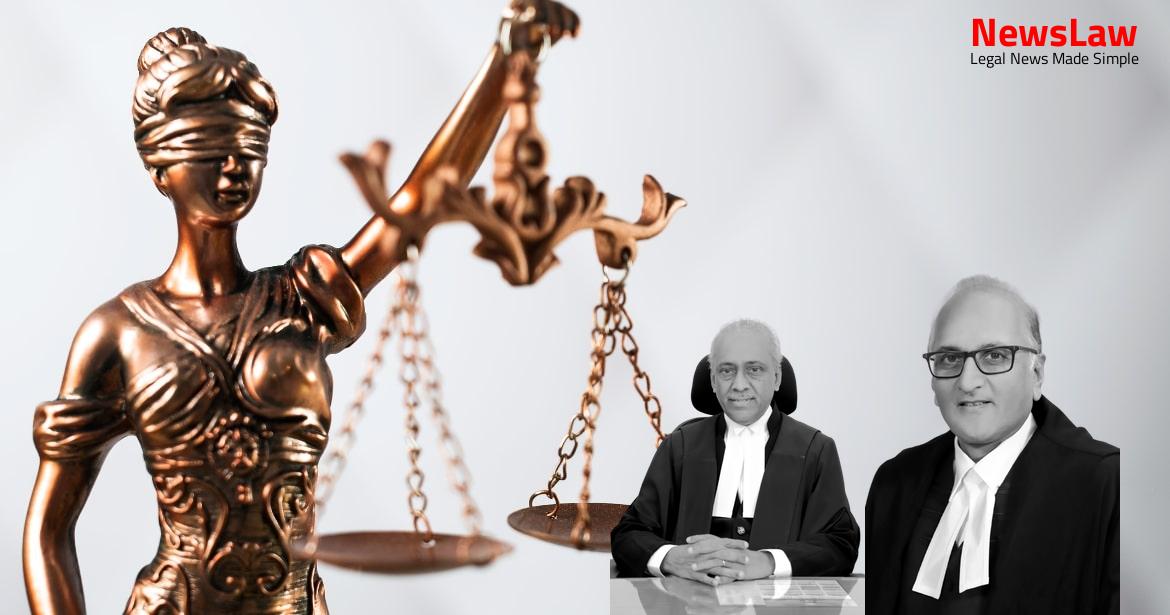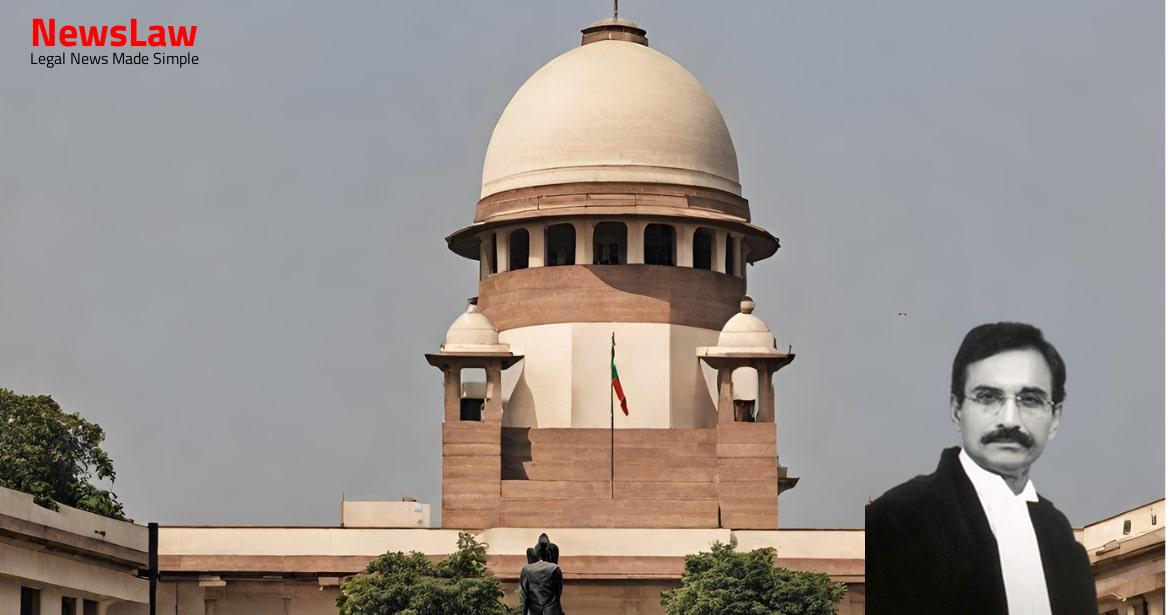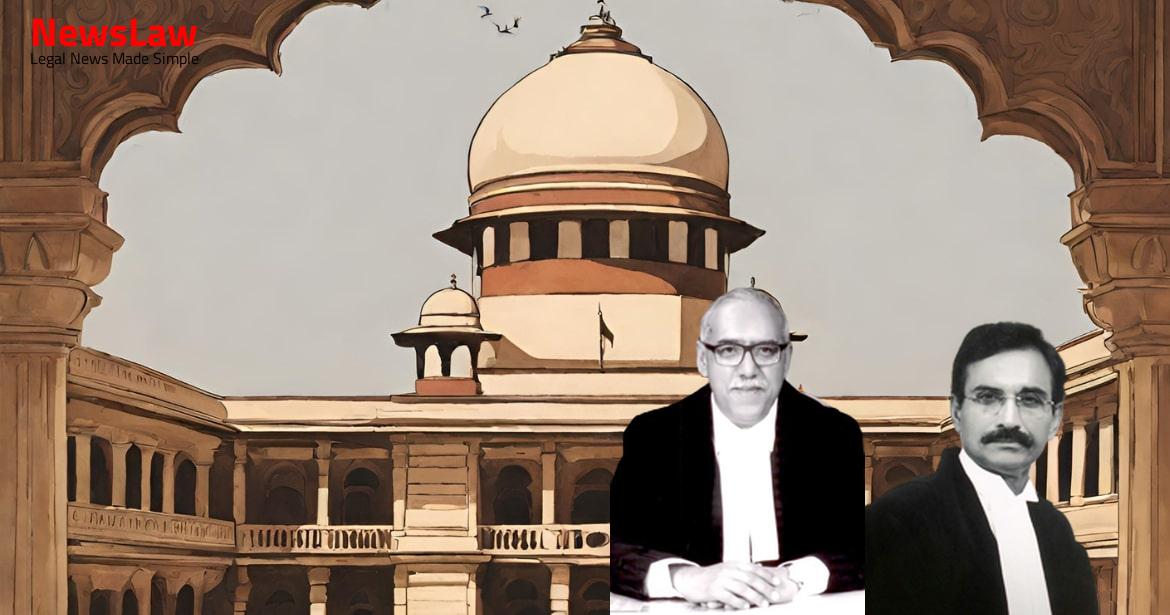Delve into the detailed legal analysis of market value determination for court fees in a recent case. The court’s scrutiny of property valuation and court fee payment sheds light on the importance of accurate assessments in legal matters. Gain insights into the complexities of determining market value for court fees and the significance of adhering to legal provisions for a successful legal strategy.
Facts
- The appeals were heard finally with consent of counsel for the parties.
- The trial court’s order dated 23.04.2016 found against the plaintiff/petitioner, stating that the suits were undervalued and the court fee paid was insufficient.
- The appellant-plaintiff was not a party to the sale deed, which led the trial court to direct the plaintiff to pay ad valorem court fee on the market value of the land, a decision seen as an illegality.
- A further relief sought was for permanent injunction against the respondents/defendants to prevent interference in the plaintiff’s peaceful possession of the property.
- Defendants contended that the suit was improperly valued and the court fee paid was insufficient.
- The trial court framed relevant issues, including whether the suit was undervalued and if the court fee paid was insufficient.
- The appellant (plaintiff) filed two suits, one for cancellation of a sale deed by defendant-respondent no.1 and another for cancellation of a sale deed executed by the first two respondents in favor of the purchaser.
- The plaintiff filed a writ petition before the High Court, arguing that the land in dispute was agricultural land.
- Fixation of circle rate by the collector is the proper mode for determining market value.
- The circle rate fixed by the Collector is considered to represent the actual market value of the property in the area.
- High Court accepted that the circle rate accounted for the correct market value of the property.
Also Read: Legal Analysis of Claim for Loss of Profit in Delayed Contract
Arguments
- Market value in sale deed mentioned at ₹11,79,09,000/- and ₹7,20,36,000/- respectively, not the correct market value.
- Circle rate fixed by the collector for charging stamp duty is not the correct market value.
- Market value mentioned in sale deed for stamp duty payment is incorrect.
- Plaintiff paid 1/5th on the market value as assessed, i.e., 30 times the revenue.
- Land in dispute is revenue payable land, suits were correctly valued at 30 times the revenue fixed by the state.
- The court must consider the averments of the plaint in determining the market value for the purpose of court fee and jurisdiction, not solely rely on the plaintiff’s contentions.
- Plaintiff cannot provide contradictory market values in the same plaint, leading to confusion in court fee payment and jurisdiction determination.
- The circle rate fixed by the collector is considered the correct mode for fixing the market value unless proven otherwise by the party challenging it.
- Market value may vary from the circle rate, but unless proven incorrect, the circle rate is deemed as the appropriate market value assessment.
Also Read: Public Declaration Requirement in Marriage under Hindu Marriage Act
Analysis
- The Court examined the distinction between seeking cancellation and seeking a declaration in suits for voiding instruments like sale deeds
- Ad valorem court fee is required for cancellation of deeds based on the consideration in the deed
- The U.P. Amendment Act applies for valuation of suits involving cancellation or declaring instruments void without any consequential reliefs
- Payment of court fees under Section 7(iv-A) is determined based on whether the plaintiff was a party to the instrument involved in the suit
- The correct market value for court fee purposes was determined in accordance with the U.P. Amendment Act and the provisions of the Court Fees Act
- The trial court and the High Court correctly held that court fees had to be paid under Section 7(iv-A) for suits involving cancellation or declaring void instruments
- Property valuation for specific suits is determined based on the relief sought in the plaint.
- The market value of immovable property is deemed to be the value computed in accordance with specific sub-sections.
- In suits for possession of land between tenants or against trespassers, the value is determined based on the annual rent recorded in the Collector’s register.
- Value determination also varies based on the type of tenancy and the nature of the property.
- The market value of property is crucial in determining court fees and jurisdiction in specific suits.
- Court fees leviable shall not exceed specified limits based on the relief sought.
- Explanation provided for calculating the market value of immovable property for court fee purposes.
- Different reliefs in the plaint are valued separately for court fees purposes.
- Specific amounts and multiples are used to calculate the value of the subject matter in different types of suits.
- The court fees paid are based on the valuation of the relief sought in the plaint.
- The decision in Suhrid Singh’s case is not applicable to the present case as the U.P. Amendment Act was not considered in that case.
- The State of Punjab has different provisions compared to the State of U.P. and the U.P. Amendment Act was not relevant in the previous case.
- The judgment in Suhrid Singh’s case does not apply to the current situation.
- The Plaintiff valued the suit at Rs. 30 lakhs for pecuniary jurisdiction but paid a fixed court fee of Rs. 200 which was not in accordance with the amended provisions.
- Section 7(iv-A) of the U.P. Amended Act specifically covers payment of court fee in cases involving cancellation or adjudging/declaring void an instrument securing property with monetary value.
- Article 17(iii) of Schedule II of the Court Fees Act is not applicable when Section 7(iv-A) of the U.P. Amended Act is relevant.
- The impugned judgment and order, as well as that of the trial court, are not sustainable.
- The reasoning and conclusions of the High Court are not sustainable.
- The question of determining the market value based on the revenue payable will be an issue to be tried in the suit.
Also Read: OCI Cardholders’ Rights and Retroactive Notifications
Decision
- The appeals succeeded
- The appeals were allowed
- No order was made on costs
Case Title: AGRA DIOCESAN TRUST ASSOCIATION Vs. ANIL DAVID (2020 INSC 210)
Case Number: C.A. No.-001722-001722 / 2020



